What could be more routine than saving seeds from one season to the
next? After all, that is how we grow crops on our farms and in our
gardens. Yet from Guatemala to Ghana, from Mozambique to Malaysia, this
basic practice is being turned into a criminal offence, so that half a
dozen large multinational corporations can turn seeds into private
property and make money from them.
But people are fighting back and in several countries popular
mobilisations are already forcing governments to put seed privatisation
plans on hold.
GRAIN has produced an updated dataset
on how so-called free trade agreements are privatising seeds across the world.
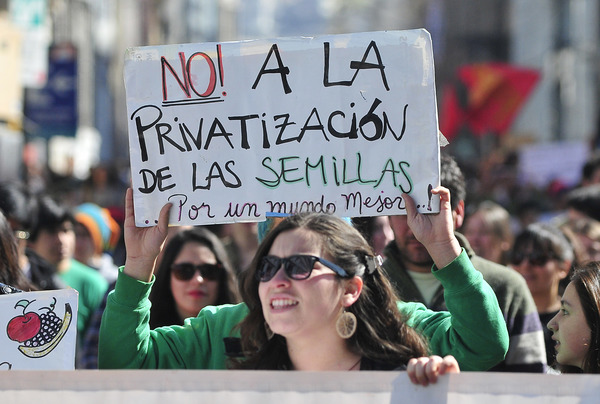 Guatemala’s
trade agreement with the US obliges it to adhere to the UPOV
Convention. But popular resistance forced the government to repeal a
national law passed for this purpose. (Photo: Raúl Zamora)
Guatemala’s
trade agreement with the US obliges it to adhere to the UPOV
Convention. But popular resistance forced the government to repeal a
national law passed for this purpose. (Photo: Raúl Zamora)
Trade agreements have become a tool of choice for governments, working
with corporate lobbies, to push new rules to restrict farmers' rights to
work with seeds. Until some years ago, the most important of these was
the World Trade Organization's (WTO) agreement on Trade-Related Aspects
of Intellectual Property Rights (TRIPS). Adopted in 1994, TRIPS was, and
still is, the first international treaty to establish global standards
for “intellectual property” rights over seeds.1
The goal is to ensure that companies like Monsanto or Syngenta, which
spend money on plant breeding and genetic engineering, can control what
happens to the seeds they produce by preventing farmers from re-using
them – in much the same way as Hollywood or Microsoft try to stop people
from copying and sharing films or software by putting legal and
technological locks on them.
But seeds are not software. The very notion of “patenting life” is
hugely contested. For this reason, the WTO agreement was a kind of
global compromise between governments. It says that countries may
exclude plants and animals (other than micro-organisms) from their
patent laws, but they must provide some form of intellectual property
protection over plant varieties, without specifying how to do that.
Trade agreements negotiated outside the WTO, especially those initiated
by powerful economies of the global North, tend to go much further.
They often require signatory countries to patent plants or animals, or
to follow the rules of the Geneva-based Union for the Protection of New
Plant Varieties (UPOV) that provide patent-like rights over crop
varieties. Whether in the form of patent laws or UPOV, these rules
generally make it illegal for farmers to save, exchange, sell or modify
seeds they save from so-called protected varieties.2
In fact, in 1991 the UPOV convention was modified to give even stronger
monopoly powers to agribusiness companies at the expense of small and
indigenous farming communities. This 1991 version of UPOV now gets
widely promoted through trade deals.
Onslaught of FTAs
The North America Free Trade Agreement – signed by Mexico, Canada and
the US, at about the same time TRIPS was being finalised – was one of
the first trade deals negotiated outside the multilateral arena to carry
with it the tighter seed privatisation noose. It obliged Mexico to join
the UPOV club of countries giving exclusive rights to seed companies to
stop farmers from recycling and reusing corporate seeds. This set a
precedent for all US bilateral trade agreements that followed, while the
European Union, the European Free Trade Association and Japan also
jumped on the same idea.3
A nonstop process of diplomatic and financial pressure to get countries
to privatise seeds “through the back door” (these trade deals are
negotiated in secret) has been going on since then. The stakes are high
for the seed industry. Globally, just 10 companies control 55% of the
commercial seed market.4
But for these corporations, that market share is still not enough.
Across Asia, Africa and Latin America, some 70-80% of the seeds farmers
use are farm-saved seeds, whether from their own farms or from
neighbours or nearby communities. In these unconquered territories, the
agribusiness giants want to replace seed saving with seed markets and
take control of those markets. To facilitate this, they demand legal
protections from governments to create and enforce corporate monopoly
rights on seeds. This is where free trade agreements come in as a
perfect vehicle to force countries to change their laws.
Latest trends
GRAIN has been tracking how trade deals signed outside the multilateral
system are coercing countries to adopt the industry's wish-list of
intellectual property rights for seeds, and ratchet up global standards
in that process, since 15 years. A recent update of our dataset shows
that this trend is not letting up. In fact, there are worrisome signs on
the horizon.
◦ The most important recent gains for Monsanto, Dupont, Limagrain and
Syngenta – the world's top seed companies – have come from new trade
deals accepted by Latin American states. In 2006, the US (home to
Monsanto and Dupont) closed major deals with Peru and Colombia forcing
both countries to adopt UPOV 1991. The EFTA states (home to Syngenta)
did the same in 2008 and the EU (home to Limagrain) in 2012.5
In Central America, a similar pattern occurred. The US secured a very
powerful Central America Free Trade Agreement in 2007, forcing all
countries to adhere to UPOV 1991. EFTA did the same last year.
◦
An important step towards stronger proprietary seed markets was recently
taken in Africa. After ten years of talks, Economic Partnership
Agreements (EPAs) were concluded between the EU and sub-Saharan African
states in 2014. Most of them “only” liberalise trade in goods for now,
but also contain a commitment to negotiate common intellectual property
standards with Brussels. The expectation is that those standards will be
based on what the Caribbean states already agreed to in their 2008 EPA:
an obligation to at least consider joining UPOV. This is significant
because until now African states have been under no obligation to adopt
UPOV as a standard, and actually tried to come up with their own systems
of plant variety protection.6
And while it's true that African entities like the anglophone African
Regional Intellectual Property Organisation (ARIPO) and the francophone
African Intellectual Property Organisation (OAPI) are already joining
UPOV, under the EU trade deals, countries themselves would be the ones
to join. Further towards the horizon, Africa is harmonising within
itself as its subregional trade blocs merge and unite to form a single
continental free trade zone, supposedly by 2017. This is expected to
bring with it an internal harmonisation of intellectual property laws
across the continent, likely tightening the noose even further.
◦ The Trans-Pacific Partnership (TPP) agreement is possibly the
scariest FTA under negotiation right now in terms of what it may do to
farmers' rights to control seeds in Asia and the Pacific. This is
because the US, which is leading the talks with 11 other Pacific Rim
countries, is playing hardball. Leaked negotiating text from May 2014
shows the US calling not only for UPOV 1991 to be applied in all TPP
states but also for the outright patenting of plants and animals. We
don't yet know whether these demands will also appear in the
Transatlantic Trade and Investment Partnership (TTIP) currently being
negotiated between the US and the EU, as the text remains inaccessible
to the public.
◦ While the extent of what has to be privatised expands, so do the
penalties for disrespecting these norms. Under numerous FTAs, countries
like the US require that farmers who infringe on these new intellectual
property rights on seeds face punishment under criminal law instead of
civil law. In some cases, like the recently concluded EU-Canada
Comprehensive Economic and Trade Agreement (CETA), the mere suspicion of
infringement could see a farmer's assets seized or have their bank
accounts frozen.7
Big battles heating up
The good news is that social movements are not taking this sitting
down. They are becoming very active, vocal, bold and organised about
this. In 2013, Colombians from all walks of life were shaken up when
they saw firsthand how US and European FTAs could result in their own
government violently destroying tonnes of seeds saved by farmers who did
not know what the new rules were. The outrage, breaking out in the
midst of a massive national agrarian strike, was so strong that the
government actually agreed to suspend the law temporarily and re-examine
the issue directly with farmers' representatives.8
In 2014, it was Guatemala’s turn to be rocked when the general public
realised that the government was pushing through the adoption of UPOV
1991 without proper debate because of trade deals like CAFTA.9
People were furious that indigenous communities were not consulted as
is required, especially when the purpose of the law – ultimately – is to
replace indigenous seeds with commercial seeds from foreign companies
like Monsanto or Syngenta. After months of pressure, the government
backed down and repealed the law.10
But – as in Colombia – this retreat is only temporary while other
measures will be looked at. In yet other parts of Latin America, like in
Chile and Argentina, new laws to implement UPOV 91, often dubbed
“Monsanto Laws”, are also being intensely and successfully resisted by
social movements.
In Africa too, waves of public protest are rising against the plant
variety protection regimes which countries are now going into. In Ghana,
a vibrant campaign is under way to stop the country from adopting UPOV
1991 legislation.11
Elsewhere, civil society networks like
the broad based Alliance for Food Sovereignty in Africa are filing
appeals to stop ARIPO from adopting UPOV-based legislation and joining
the union.12
Corporate interest groups have pushed too far trying to privatise what
people consider a commons. This is not limited to seeds. The same
process has been going on with land, minerals, hydrocarbons, water,
knowledge, the internet, even important microorganisms, like avian flu a
few years ago or the Ebola virus today. People are fighting back to
stop these things falling under the exclusive control of a few
corporations or defence ministries. A good way to take part in this
battle is to join the campaigns to stop important new trade deals like
TTIP, CETA, TPP and the EPAs – and to get old ones like the US and
European deals with Mexico, Central America, Colombia or Chile
rescinded. Trade deals are where a lot of these rules do get written and
that is where they should be erased.
For a closer look at the status of trade agreements that impose seed privatisation, download GRAIN's November 2014 dataset, “Trade agreements privatising biodiversity”.
Going further
- GRAIN, “Seed laws in Latin America: the offensive continues, so does popular resistance”, December 2013. (EN, ES, FR)
- Biodiversidad, “Leyes de semillas y otros pesares”, September 2014. (ES only)
- Daily updates on trade deals at http://bilaterals.org or @bilaterals_org or https://www.facebook.com/bilaterals.org (EN, ES, FR)
Notes
1
“Intellectual property” is a government enforced monopoly right. It
serves to ensure that people pay for the right to use something for a
certain period of time, so that whoever invented it can recoup his or
her investment. “Plant variety” means seeds which will grow into a
specific kind of plant with specific characteristics.
2
Under the UPOV system, farmers can sometimes save seeds from protected
varieties to use them again. It depends on which version of the UPOV
Convention a country signs and whether the government exercises this
option. Sometimes it is restricted to farmers' replanting the seeds on
their own farm or to only certain crops or to payment of a licence.
Under the patent system, it is simply illegal to use patented seeds
without paying for them – even if a bird drops them onto your field!
3 EFTA is composed of Iceland, Lichtenstein, Norway and Switzerland.
5 Ecuador is also now negotiating with the EU, based on the text signed with Colombia and Peru.
6 For example, the Organisation of African Unity drafted its own model law on plant variety protection based on community rights.
9 Perhaps not very visible to the public eye was the 2013 EFTA-Central America FTA, which makes the same demands as CAFTA.

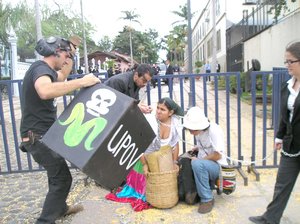
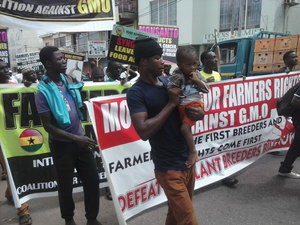
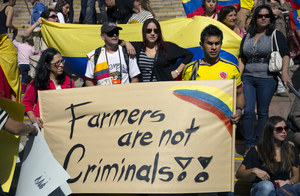
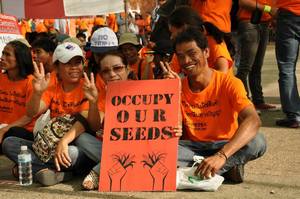 September
2013 protest against FTAs: in Thailand, popular movements are resisting
the possibility that talks over a free trade agreement between Thailand
and the EU will result in UPOV being imposed on the nation’s farmers.
(Photo: FTA Watch)
September
2013 protest against FTAs: in Thailand, popular movements are resisting
the possibility that talks over a free trade agreement between Thailand
and the EU will result in UPOV being imposed on the nation’s farmers.
(Photo: FTA Watch)